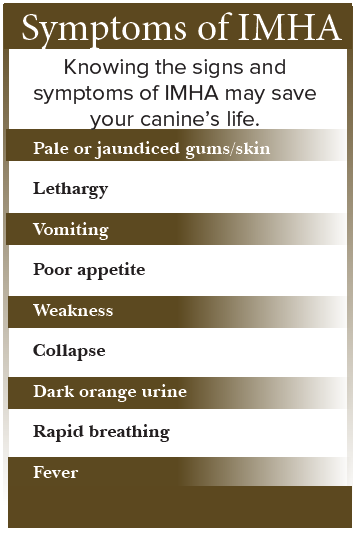 Knowing the signs and symptoms of immune-mediated hemolytic anemia (IMHA) may save your canine’s life. If left unnoticed and untreated, IMHA can prove to be deadly quickly.
Knowing the signs and symptoms of immune-mediated hemolytic anemia (IMHA) may save your canine’s life. If left unnoticed and untreated, IMHA can prove to be deadly quickly.
IMHA is a condition where the immune system goes haywire and starts attacking and destroying its own red blood cells. In about 25 to 40 per cent of cases, it can identify a trigger causing the immune system to malfunction. The condition can be triggered by cancer, infections, certain parasites, drug reactions, and potentially some vaccinations. These cases are called secondary IMHA because a trigger has been identified.

Malfunction of Immune System
The other 60 to 75 per cent of cases have no obvious reason. “There is clearly a malfunction of the immune  system, but we don’t know why this occurs. It is only by ruling out all of the possible triggers that we reach this diagnosis of primary IMHA. We know that genetics must play a role because some breeds are far more predisposed to primary IMHA, but it can also happen to low-risk breeds,” explained Dr. Victoria Bamberger, DVM Veterinarian, VCA Canada Alta Vista Animal Hospital.
system, but we don’t know why this occurs. It is only by ruling out all of the possible triggers that we reach this diagnosis of primary IMHA. We know that genetics must play a role because some breeds are far more predisposed to primary IMHA, but it can also happen to low-risk breeds,” explained Dr. Victoria Bamberger, DVM Veterinarian, VCA Canada Alta Vista Animal Hospital.
Good parasite prevention can help prevent the transmission of some of the infections that trigger IMHA, such as particular tick-borne illness and heartworm, to a small degree. The selection of appropriate vaccinations based on your dog’s lifestyle and risk factors should also be discussed with your veterinarian. “For the most part, we are at the mercy of a dog’s genetic makeup because that is the biggest determinant of immune function and dysfunction,” says Dr. Bamberger. In a primary care setting, Dr. Bamberger shared they don’t see cases of IMHA often. “I might diagnose a case every year or two,” she noted.
“In the emergency care setting, we see it quite frequently. This is because dogs can be fairly asymptotic in the early stages and then suddenly deteriorate and require emergency treatment.” The first step in treating IMHA is to run a battery of tests to make sure that primary IMHA is being treated and not secondary IMHA.

Treating IMHA
These tests, bloodwork, abdominal ultrasound, chest x-rays, and 4Dx test for tick-borne illnesses and heartworm, are necessary to ensure any triggering caused aren’t being missed. Dr. Bamberger explained, “If a dog’s IMHA is being triggered by an infection, you have to treat that infection before you can successfully treat the anemia.” She continued, “Once we know that we are dealing with primary IMHA, we need to stop the immune system from targeting its own red blood cells. ”This process involves using immunosuppressive medications such as prednisone, cyclosporine, mycophenolate, and leflunomide. Dogs with IMHA can be very anemic and close to death. These dogs are given blood transfusions and oxygen.
Many dogs require low-dose aspirin or other clot-breaking medication to help prevent blood clots, which is a common cause of death in these patients. “Treating a critical IMHA patient is very labour intensive and can take several tense days before we know if we will be successful. These medications must be continued for several months and weaned very gradually to help prevent a relapse of the condition,” says Dr. Bamberger. She recommends people learn if their dog is a high-risk breed. Cocker spaniels are the most common breed affected, followed by bichons, collies, other small white dogs, and Old English Sheepdogs. It should be noted that cats can also be affected by Immune-Mediated Hemolytic Anemia. Dr. Bamberge says regardless of breed, getting to know your dog’s normal gum colour is important.

IMHA Symptoms
If you check your dog’s gums regularly, you’re more likely to notice if they become pale or jaundiced. Other clinical signs and symptoms include lethargy, vomiting, poor appetite, weakness, collapse, dark orange urine, rapid breathing, or a fever. These symptoms can sometimes be very mild, so it doesn’t mean that every time your dog seems tired, he should be rushed to the vet. But if he is consistently fatigued with no explanation, this warrants a checkup. Treating IMHA early is much easier, and less expensive, than treating a full-blown crisis,” Dr. Victoria Bamberger warned. IMHA is one of the most common causes of severe anemia, but there are many other causes. Some chronic diseases can cause mild anemia, but there are several ways to tell this apart from IMHA on a blood profile.
Another cause of severe anemia would be any condition that causes sudden blood loss. Next to trauma, the most common causes of severe blood loss would be ruptured abdominal tumours and intestinal bleeding. Dr. Bamberger went on to say, “Because there are so many causes of anemia, dogs require multiple tests to ensure we are identifying and treating the right problem.”










